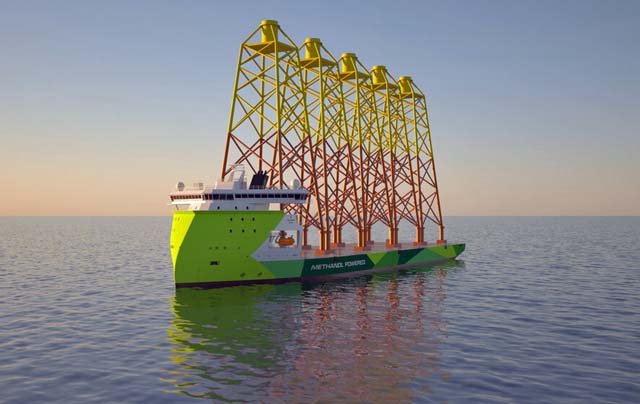To meet the increasing logistic requirements for ever-growing offshore wind components transported across the globe, Ulstein has added the HX121 heavy transport vessel to its design portfolio.
The design features an Ulstein X-Bow to improve seakeeping, maximise deck space and an optimised aft ship for low fuel consumption, resulting in a balanced design relying on proven technologies, which optionally can furnish DP2.
Ulstein says that the current fleet of heavy transport vessels does not meet the future demand of the offshore wind segment. Over 380GW of offshore wind capacity, across 32 markets, is predicted to be added in the next 10 years. Besides a substantial fleet of installation vessels, new tonnage is needed to transport the foundations and wind turbines from worldwide fabrication locations to marshalling ports or offshore fields.
Edwin van Leeuwen, MD Ulstein Design & Solutions, said: “Traditionally, the offshore wind sector has made use of barges or semi-submersible heavy lift vessels for the transportation of wind turbine components; however the market is looking for more efficient and low emission vessels to transport large components. The Ulstein HX121 has been developed in close contact with industry partners to find the key requirements for this next generation of heavy transport vessels.”
Dolf Manschot, Project Manager Ulstein Design & Solutions added: “The HX121 design is the latest and largest design in Ulstein’s portfolio of heavy transport vessel. The Ulstein Blended Design method was used to find the optimal main dimensions and service speed for efficiently transporting large wind components. This design method enabled us to minimise the fuel consumption per transported component. Furthermore, we focused on load and unload cargo making use of roll on roll off technology.”
To fulfil the market demand for low emission vessels, the HX121 is designed to operate on methanol fuel. Powering the vessel with green methanol would dramatically reduce the carbon footprint, while E-methanol could even reduce the carbon footprint to zero. As a marine fuel methanol is thought to offer many advantages, it is the safest alternative fuel, easy to store and relatively inexpensive to produce.



